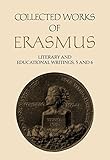Collected Works of Erasmus : Literary and Educational Writings, 5 and 6 / Desiderius Erasmus; ed. by A.H.T. Levi.
Material type: TextSeries: Collected Works of Erasmus ; DOBDPublisher: Toronto : University of Toronto Press, [1986]Copyright date: ©1986Description: 1 online resource (638 p.)Content type:
TextSeries: Collected Works of Erasmus ; DOBDPublisher: Toronto : University of Toronto Press, [1986]Copyright date: ©1986Description: 1 online resource (638 p.)Content type: - 9780802056023
- 9781442676718
- 199/.492
- PA8502.E5 ǂb T45 1986eb
- online - DeGruyter
| Item type | Current library | Call number | URL | Status | Notes | Barcode | |
|---|---|---|---|---|---|---|---|
 eBook
eBook
|
Biblioteca "Angelicum" Pont. Univ. S.Tommaso d'Aquino Nuvola online | online - DeGruyter (Browse shelf(Opens below)) | Online access | Not for loan (Accesso limitato) | Accesso per gli utenti autorizzati / Access for authorized users | (dgr)9781442676718 |
Browsing Biblioteca "Angelicum" Pont. Univ. S.Tommaso d'Aquino shelves, Shelving location: Nuvola online Close shelf browser (Hides shelf browser)

|

|

|

|

|

|

|
||
| online - DeGruyter Collected Works of Erasmus : Literary and Educational Writings 7 / | online - DeGruyter Collected Works of Erasmus : Literary and Educational Writings, 1 and 2 / | online - DeGruyter Collected Works of Erasmus : Literary and Educational Writings, 3 and 4 / | online - DeGruyter Collected Works of Erasmus : Literary and Educational Writings, 5 and 6 / | online - DeGruyter Literary Discourse : A Semiotic-Pragmatic Approach to Literature / | online - DeGruyter Literature in the Light of the Emblem / | online - DeGruyter Liturgies in Honour of Thomas Becket / |
restricted access online access with authorization star
http://purl.org/coar/access_right/c_16ec
Satire, as the concept was understood in the sisteenth century, covered any sort of commentary on personal or social behaviour or values. The six works collected in these two volumes are among the most important examples of Erasmus' satire, in the sixteenth-century sense of the word, and, in some cases, judged by modern standards as well. they reveal a great deal, not only about Erasmus' attitudes to the moral questions of his time, but also about the circumstances of his own life.These satires reflect aspect of the religious, political, social, and military conflicts of the time and the qualities that enabled Erasmus to articulate them: great intelligence, remarkable shrewdness, deep sensitivity, spectacular ability, and a boundless capacity for staying cool.
Mode of access: Internet via World Wide Web.
In English.
Description based on online resource; title from PDF title page (publisher's Web site, viewed 01. Nov 2023)


